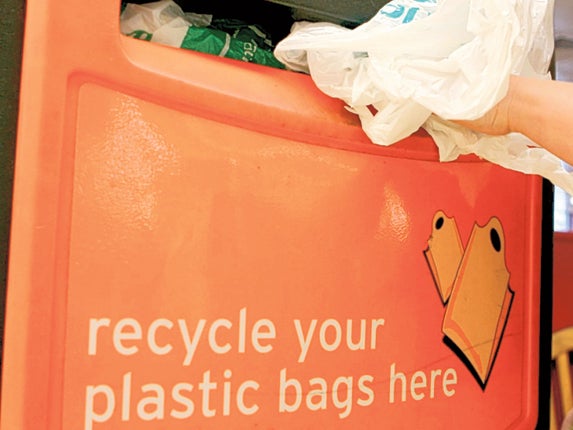Dramatic fall in number of plastic bags given out by supermarkets

The number of "single-use" plastic bags given to customers by leading UK supermarkets has fallen for the fourth year in a row.
The total has dropped from 10.6 billion in 2006 to 6.1 billion in the year to May, a reduction of 43 per cent, the British Retail Consortium (BRC) said. That compares with a reduction of 37 per cent in the year to May 2009. Over the same period the total weight of material used has more than halved.
The BRC said the figures were "a ringing endorsement" of the voluntary approach taken by supermarkets at a time when sales volumes increased by more than 6 per cent.
To forestall the threat of legislation or a government-imposed bag charge at the checkout, seven of the big stores have made two successive agreements to cut back on plastic bag use. The stores involved are Asda, the Co-operative Group (now incorporating Somerfield), Marks & Spencer, Sainsbury's, Tesco and Waitrose.
There is no formally agreed a new target, but bag use is still being monitored by the Waste and Resources Action Programme (Wrap). The figure for supermarket distribution of all carrier bags, including reusable bags, has also continued to decline, and the new numbers for 2009/10 show a decline of 41 per cent over 2006 against 35 per cent in 2008/9. But in one accounting measure, a spot-check analysis of bag use during the month of May, the number of single-use bags had increased compared with last year.
In May 2009 the one-month figure was 48 per cent below that of 2006 – just missing the 50 per cent target the supermarkets had set themselves, and so prominently publicised. But this year the "snapshot" May figure for single-use bags was only 45 per cent below that for 2006, suggesting that momentum may be falling.
In general, though, the figures are very positive. "This is a tremendous achievement by supermarkets, customers and staff, especially as between 2006 and 2009 the amount of goods sold by participating retailers grew by over 6 per cent," the BRC Director-General, Stephen Robertson said.
"The sustained reduction shows that customers are permanently adopting the habit of reusing their bags. The continuous decrease in total annual bag use demonstrates the voluntary approach continues to make good progress."
He added: "The reduction in bag use is great news, but it's the halving of the total weight of single-use carrier bags which shows retailers really scoring on the crucial issue of reducing environmental impact. Retailers are working hard on a range of other environmental measures, such as reducing food waste, reducing and redesigning packaging, as well as providing customers with recycling information through the on-pack recycling label."
Wrap said yesterday that the decrease by 4.5 billion per year in 2006 to 6.5 billion in 2009/10 had reduced the amount of material used by 39,700 tonnes annually.
First introduced by the US in 1957, and into the rest of the world by the late 1960s, plastic bags are now one of the biggest scourges of the throw-away society. Worldwide, the annual total manufactured now probably exceeds a trillion. Billions find their way into the environment, especially the marine environment, where their lack of rapid degradability makes them a persistent and serious threat to marine life. They can now be found in the oceans almost everywhere, from Spitsbergen at latitude 78 degrees North, to the Falkland Islands at 51 degrees South.
Subscribe to Independent Premium to bookmark this article
Want to bookmark your favourite articles and stories to read or reference later? Start your Independent Premium subscription today.

Join our commenting forum
Join thought-provoking conversations, follow other Independent readers and see their replies